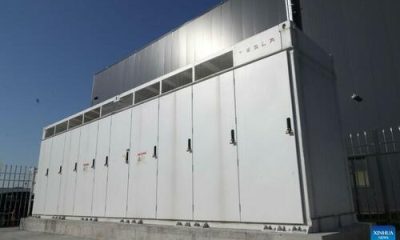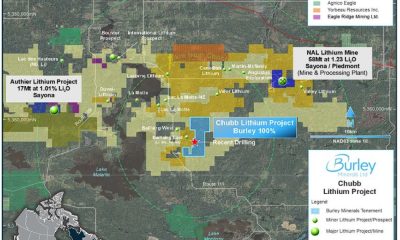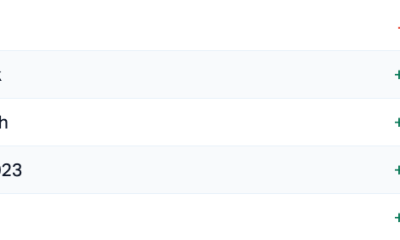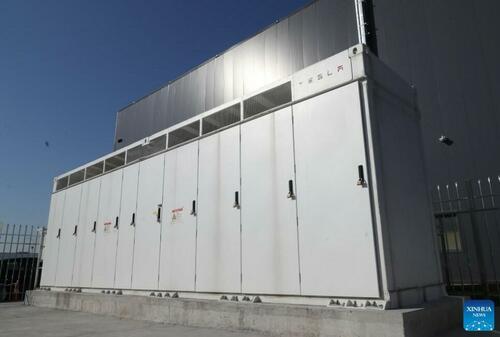Energy & Critical Metals
Vulcan begins commissioning at Lithium Extraction Optimization Plant in Germany; A-DLE
Vulcan Energy Resources, a renewable energy producer and carbon-neutral lithium developer, has commenced commissioning of its Lithium Extraction Optimization…

Vulcan Energy Resources, a renewable energy producer and carbon-neutral lithium developer, has commenced commissioning of its Lithium Extraction Optimization Plant (LEOP) for the purpose of extraction, purification, and concentration of lithium chloride from brine in the Upper Rhine Valley in Germany. This milestone represents a major step forward by Vulcan and its Zero Carbon Lithium Project. (Earlier post.)
This also represents significant progress towards enabling domestic European supply chain independence for lithium as a critical raw material and enabling a more sustainable EV battery production industry in Europe.
The commissioning phase for LEOP is expected to run until October, when first brine will be introduced into the plant for the lithium extraction process to begin.
Vulcan’s Lithium Extraction Optimization Plant at Landau
Vulcan commenced building its LEOP in 2022, designed as an optimization, operational training and product qualification facility to enable commercial operational readiness for the end of 2025. LEOP succeeds Vulcan’s pilot plant, which has successfully operated for 2.5 years, producing lithium chloride from Vulcan’s producing well sites.
To extract lithium from brine, Vulcan is using Adsorption-type DLE (A-DLE), which has been a commercially proven technology in the lithium industry since the 1990s. A-DLE is also beneficial in terms of low operating costs, greater time efficiency and a lower carbon footprint than legacy industry methods of lithium production.
The core of the A-DLE process is the use of specialized adsorbent materials that have a high affinity for lithium ions. Pre-treated brine in brought into contact with the adsorbent material, which selectively captures lithium ions from the brine. Once the material is saturated with lithium ions, it is treated with a desorption solution.
Source: Vulcan Energy
Adsorption-type DLE needs heated brine to work. Current DLE producers use gas to heat the brine. Vulcan uses geothermal brine that is already naturally heated. Excess heat is used to generate renewable energy.
Vulcan will use its proprietary sorbent VULSORB as part of the lithium extraction process.VULSORB offers higher lithium capacity than other lithium aluminate intercalate sorbents available on the market, based on Vulcan’s test work on Upper Rhine Valley Brine.
During the piloting phases, VULSORB demonstrated higher performance and lower water consumption for lithium extraction compared with commercially available sorbents tested by the company.
Once the lithium chloride is produced, it will be transported to Vulcan’s downstream Central Lithium Electrolyzer Optimization Plant (CLEOP) in Frankfurt-Höchst where the lithium chloride will be converted into lithium hydroxide, which will be tested by Vulcan’s lithium offtake partners, Stellantis, Volkswagen, Renault, Umicore and LG Energy Solution.
Vulcan’s Phase One commercial operation is targeting 24,000 tonnes per annum of lithium hydroxide production, to supply its offtakers in Europe with carbon neutral, domestically sourced lithium.
The commencement of the commissioning of our LEOP facility represents a significant milestone for us, as well as the entire European battery industry. By 2030, Europe is likely to face a significant lithium shortage, which could have serious implications for the European battery and automotive industries if domestic supplies are not realized. Vulcan is gearing up to be the first to produce lithium from Europe, for Europe, but also to be the first company worldwide to produce carbon neutral lithium. The start of the commissioning of our LEOP facility is a key step toward the implementation of Phase One of our Zero Carbon Lithium Project, and in enabling a secure and independent European supply chain for Lithium.
—Vulcan Energy CEO, Cris Moreno
Vulcan’s LEOP has been built to enable operational readiness when construction of the full commercial plant is completed, to reduce commercial ramp up time. LEOP has the same equipment that Vulcan’s commercial LEP will have, with adsorption columns at a 1:50 scale of the commercial unit, with a greater number of columns in the commercial plant. The LEOP will have the capacity to produce approximately 100 tonnes of lithium chloride solution per annum.
The production volumes at LEOP will signify the first tonnes of lithium chloride concentrate domestically produced in Europe, and the first tonnes of lithium produced using the commercially proven method of A-DLE powered from renewable heat instead of gas.

Uranium Exploration Company Announces Additional Staking in the Athabasca Basin
Source: Streetwise Reports 12/22/2023
Skyharbour Resources Ltd. announced an update from its Canada-based Falcon Project along with additional…
Tesla Launches New Mega Factory Project In Shanghai, Designed To Manufacture 10,000 Megapacks Per Year
Tesla Launches New Mega Factory Project In Shanghai, Designed To Manufacture 10,000 Megapacks Per Year
Tesla has launched a new mega factory…
Giving thanks and taking stock after “a remarkable year”
An end-of-year thank you to our readers, industry colleagues and advertisers before Electric Autonomy breaks from publishing until Jan. 2
The post Giving…












